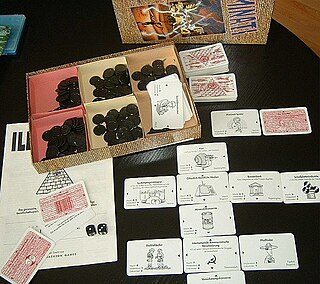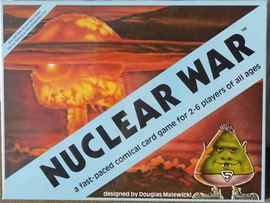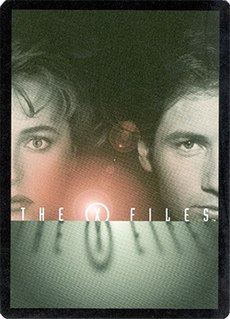Famous Game Designer Trading Cards are a series of trading cards first published by Flying Buffalo in 1992 that feature well-known game designers.
Contents

Famous Game Designer Trading Cards are a series of trading cards first published by Flying Buffalo in 1992 that feature well-known game designers.

In 1992, Rick Loomis of Flying Buffalo put together a deck of low-budget trading cards featuring seven contemporary game designers who had been inducted into the GAMA Hall of Fame:
When asked how he had chosen the seven designers, Loomis replied, "This first batch was selected by taking the first seven who sent me a photo!" [1]
The 2½" x 3½" cards were originally printed in black and white and packaged in a ziplock bag. The front features a photo of the game designer, year of induction into the GAMA Hall of Fame, hometown, best- and worst-designed games, the person's favorite game designed by someone else, and a quote from the individual. The back of the card lists the person's game design credits, and game design career path to date. [2]
The first batch of card were released at the combined Gen Con/Origins game convention in 1992, but Loomis admitted profit was not the main motivation of the designers involved: "We don’t expect to make any money on these cards; we’re doing it mostly so we can show our parents that we really are 'famous.'" [1]
Later editions of the first set were printed in color, and three more sets of cards were eventually released. [2]
In the November 1992 edition of Dragon (Issue #187), Allen Varney, himself a game designer, called the idea "fun", and said, "Here is one more honor to which the rest of us can aspire." [1]
Illuminati: New World Order (INWO) is an out-of-print collectible card game (CCG) that was released in 1994 by Steve Jackson Games, based on their original boxed game Illuminati, which in turn was inspired by the 1975 book The Illuminatus! Trilogy by Robert Anton Wilson and Robert Shea. An OMNI sealed-deck league patterned after the Atlas Games model was also developed.

Magic: The Gathering is a collectible and digital collectible card game created by Richard Garfield. Released in 1993 by Wizards of the Coast, Magic was the first trading card game and has approximately twenty million players as of 2015, and over twenty billion Magic cards produced in the period from 2008 to 2016, during which time it grew in popularity.

Richard Channing Garfield is an American mathematician, inventor, and game designer. Garfield created Magic: The Gathering, which is considered to be the first modern collectible card game (CCG). Magic debuted in 1993 and its success spawned many imitations. Garfield oversaw the successful growth of Magic and followed it with other game designs. Included in these are Keyforge, Netrunner, BattleTech(CCG), Vampire: The Eternal Struggle, Star Wars Trading Card Game, The Great Dalmuti, Artifact, and the board game RoboRally. He also created a variation of the card game Hearts called Complex Hearts. Garfield first became passionate about games when he played the roleplaying game Dungeons & Dragons, so he designed Magic decks to be customizable like roleplaying characters. Garfield and Magic are both in the Adventure Gaming Hall of Fame.

Michael Austin Stackpole is an American science fiction and fantasy author best known for his Star Wars and BattleTech books. He was born in Wausau, Wisconsin, but raised in Vermont. He has a BA in history from the University of Vermont. From 1977 on, he worked as a designer of role-playing games for various gaming companies, and wrote dozens of magazine articles with limited distribution within the industry. He lives in Scottsdale, Arizona.

Kenneth Eugene St. Andre is an American fantasy author and game designer, best known for his work with Tunnels & Trolls and Wasteland. He has been an active member of The Science Fiction and Fantasy Writers of America since 1989.

Illuminati is a standalone card game made by Steve Jackson Games (SJG), inspired by the 1975 book, The Illuminatus! Trilogy, by Robert Anton Wilson and Robert Shea. The game has ominous secret societies competing with each other to control the world through various means, including legal, illegal, and even mystical. It was designed as a "tongue-in-cheek rather than serious" take on conspiracy theories. It contains groups named similarly to real world organizations, such as the Society for Creative Anachronism and the Symbionese Liberation Army. It can be played by two to eight players. Depending on the number of players, a game can take between one and six hours.

Nuclear War is a collectible common-deck card game designed by Douglas Malewicki, and originally published in 1965. It is currently published by Flying Buffalo, and has inspired several expansions. It is a satirical simulation of an end-of-the-world scenario fought mostly with nuclear weapons.

Cosmic Encounter is a science fiction–themed strategy board game designed by "Future Pastimes" and originally published by Eon Games in 1977. In it, each player takes the role of a particular alien species, each with a unique power to break one of the rules of the game, trying to establish control over the universe. The game was inducted into the Academy of Adventure Gaming Arts & Design Adventure Gaming Hall of Fame in 1997.

Flying Buffalo Incorporated (FBI) is a Scottsdale, Arizona game company that publishes role playing games, card games, gaming materials, and runs Play-by-mail games.

Middle-earth Collectible Card Game (MECCG) is an out-of-print collectible card game released by Iron Crown Enterprises in late 1995. It is the first CCG based on J.R.R. Tolkien's fictional universe of Middle-earth, with added content from ICE's Middle-earth Role Playing Game.
Hacker is a card game for 3–6 players published by Steve Jackson Games (SJG) in 1992.

Marc William Miller is a wargame and role-playing game designer and author.
On The Edge was a collectible card game released in 1994, not long after Magic: The Gathering. The setting and characters were based on the RPG titled Over the Edge. The game's story was set on an island in the southern Mediterranean called Al Amarja, where various factions were fighting for control.

The X-Files Collectible Card Game is an out-of-print collectible card game based on The X-Files fictional universe. It was created by the US Playing Card Company (USPCC).

Blood Wars is an out-of-print collectible card game produced by TSR, based on the Planescape campaign setting from Dungeons & Dragons.
Elizabeth T. Danforth is a creator in the role-playing game and video game industries. Although primarily known as an illustrator, she is also an editor, writer, game scenario designer, and game developer. She received her BA in Anthropology from Arizona State University, and her MLS from the University of Arizona. She has worked in the game industry continuously since the mid 1970s.

Paul Richard "Rich" Banner is an American game designer and graphic artist.

A collectible card game (CCG), also called a trading card game (TCG), among other names, is a type of card game that mixes strategic deck building elements with features of trading cards, introduced with Magic: The Gathering in 1993. Generally a player may begin playing a CCG with a pre-made starter deck, and then customize their deck with a random assortment of cards acquired through booster packs, or from trading with other players, building up their own library of cards. As a player obtains more cards, they may create new decks from scratch from their library. Players are challenged to construct a deck within limits set by the CCG's rules that will allow them to outlast decks constructed by other players. Games are commonly played between two players, though multiplayer formats are also common. Gameplay in CCG is typically turn-based, with each player starting with a shuffled deck and on their turn, drawing and playing cards to attack the other player and reduce their health points to zero before their opponent can do the same to them. Dice, counters, card sleeves, or play mats are used to complement gameplay. CCG tournaments exist for expert players to compete for prizes.
Steven S. Crompton is a Canadian-born artist, author and designer who has worked in the role-playing and comic genres since 1981. In the gaming industry he is best known as the artist for the Grimtooth Traps books as well as other Catalyst role-playing game supplements, Tunnels & Trolls and the Nuclear War card game.

Rick Loomis was an American game designer, most notable as the founder of game publisher Flying Buffalo, which he managed until his death.